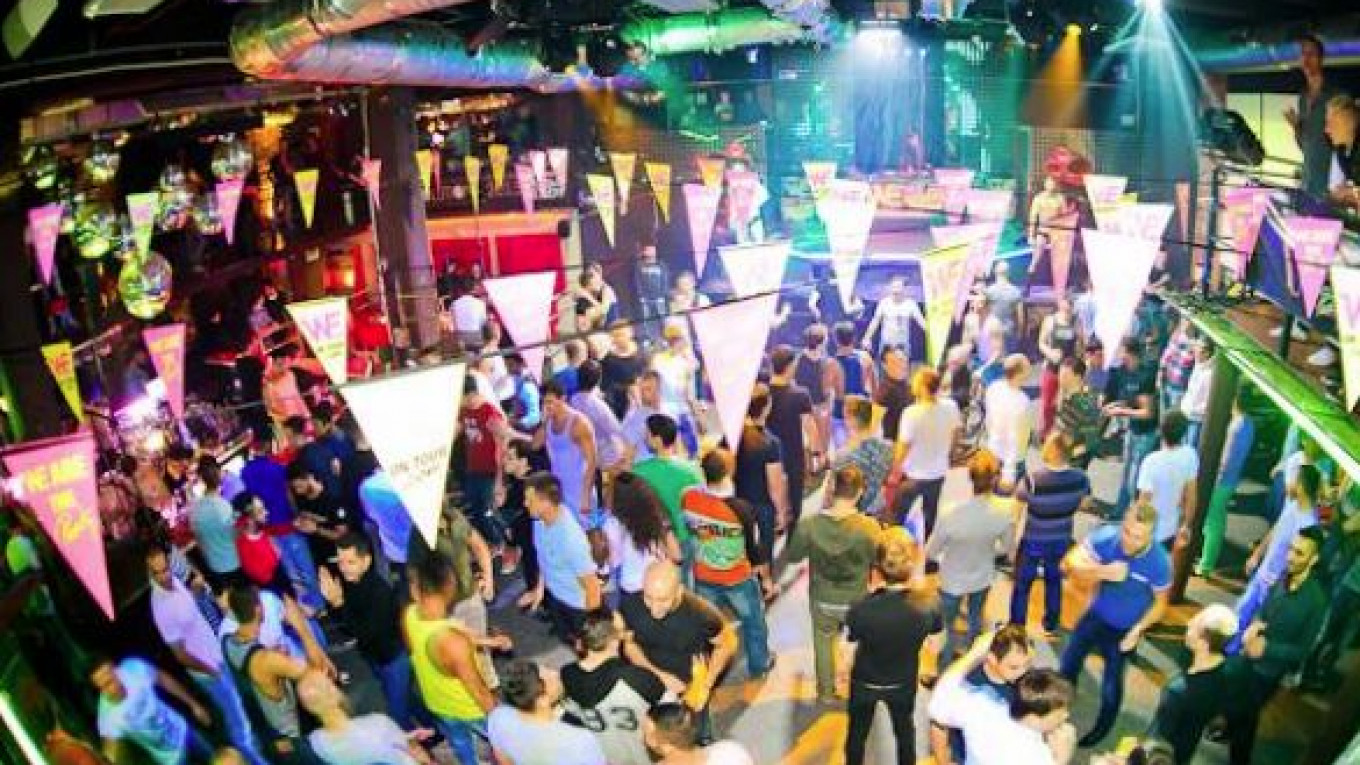The head of Moscow's biggest gay club has asked President Vladimir Putin to take measures to protect the club from repeated attacks, which he says are part of an attempt to put pressure on its owners to shut the club down.
Some 100 people seized the attic of the Central Station club on Saturday, fully "dismantling" the roof of the building and stealing or disabling some of the club's utility equipment, Andrei Lishchinsky wrote in a letter to Putin, arguing that the actions were provoked by hatred toward gays.
In his letter, Lishchinsky said he decided to address Putin directly because the president had on numerous occasions made remarks about the state of gay rights in Russia, saying for instance that the law approved this year banning "gay propaganda" among minors did not encroach on gay rights or create an atmosphere of intolerance in society, contrary to the opinion of the law's many critics.
Saturday's attack was not the first on Central Station, one of only a handful of gay clubs in Moscow and one of the largest in Russia. But, according to Lishchinsky, police have failed to identify the organizers of the attacks and have refused to open a criminal case.
"The building was seized by a professional raiding company that served the interests of unknown foreign legal entities that ordered multiple illegal actions against LGBT visitors of the club," he wrote in the letter, a copy of which he posted to Facebook. "These actions were obviously motivated by hatred toward representatives of the LGBT community and had a clear extremist tone."
Lishchinsky did not name anyone he suspected in the attacks, but national media reported that there was a conflict between the club owners and the owners of the building in which the club is located.
On Saturday, police arrested 40 people standing near the club and said there was a conflict between the club's management and a group of workers employed by the building's owner, RIA Novosti reported. The incident caused the club owners to move a concert by Swedish group Army of Lovers that was planned to be held at Central Station to another venue.
Lishchinsky said police may have acted in the interests of those who organized the attacks on the club.
There have been more than 20 attacks from the same people in recent months, Lishchinky said in his letter. Since the end of October, "some harmful gas was sprayed" in the club several times, he said, and the club was attacked by armed men.
Gay rights advocates have noted an uptick in violence motivated by intolerance toward LGBT people in recent years, which they say is encouraged by laws such as the one banning "gay propaganda" among minors.
Attacks on gay clubs in Russia are not uncommon. In October 2012, a group of hooligans attacked Moscow gay club 7FreeDays during a party held on International Coming Out Day, hitting people, throwing bottles and overturning tables. Four people were hospitalized as a result of the attack.
Lishchinsky asked Putin to identify the police officers guilty of inactivity in relation to the attacks on Central Station, as the club owners have filed more than 30 complaints to the police and none of them have been answered.
On the contrary, the police have targeted the club for suspected illegal activity. Earlier in December, Central Station was checked by police and the Federal Drug Control Service, which suspected drug trafficking to be taking place in the club. Police failed to find any drugs during their search.
Calls to the Moscow police for comment on the situation with Central Station went unanswered Sunday.
Prominent LGBT activist Nikolai Alexeyev said it was likely that Lishchinsky's letter to Putin would go unanswered, since all letters go through the presidential administration, which forwards them not to Putin directly but to different agencies. Alexeyev has sent several appeals to Putin regarding gay rights this year without receiving responses.
He added that Lishchinsky's letter would likely be sent to the agencies he complained about in his letter — the police and the Prosecutor's General Office.
Alexeyev said he believed the attacks on Central Station had nothing to do with gay rights but instead were a "pure economic issue."
"The building got a new owner recently who tried to break the lease contract with the owners of Central Station, but failed to do so even through a court, which is why the owner started to take measures that would not allow the club to function properly," Alexeyev said.
Repeated phone calls to Central Station on Sunday went unanswered.
Contact the author at [email protected]
A Message from The Moscow Times:
Dear readers,
We are facing unprecedented challenges. Russia's Prosecutor General's Office has designated The Moscow Times as an "undesirable" organization, criminalizing our work and putting our staff at risk of prosecution. This follows our earlier unjust labeling as a "foreign agent."
These actions are direct attempts to silence independent journalism in Russia. The authorities claim our work "discredits the decisions of the Russian leadership." We see things differently: we strive to provide accurate, unbiased reporting on Russia.
We, the journalists of The Moscow Times, refuse to be silenced. But to continue our work, we need your help.
Your support, no matter how small, makes a world of difference. If you can, please support us monthly starting from just $2. It's quick to set up, and every contribution makes a significant impact.
By supporting The Moscow Times, you're defending open, independent journalism in the face of repression. Thank you for standing with us.
Remind me later.


